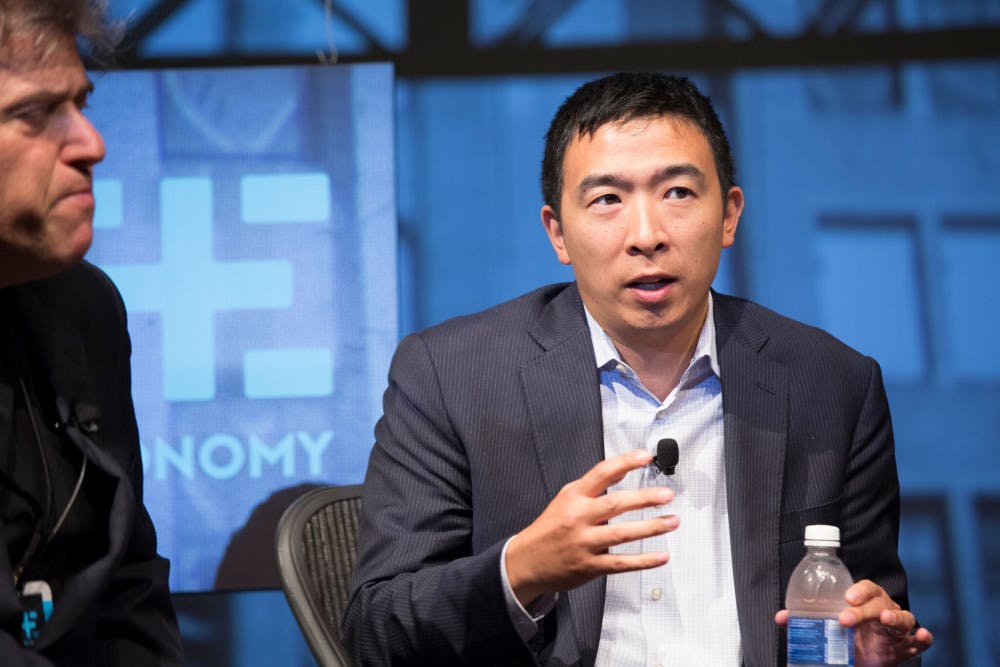When Andrew Yang ’96 was on College Hill, his life revolved around three activities: Taekwondo, working out and playing video games. Now, Yang directs his creative energy toward a different trifecta: automation, capitalism and the future of our nation. A little over two decades after graduating from the University and founding his own company, Venture for America, Yang is running for President of the United States.
An economics and political science concentrator, Yang used his two areas of study to develop the core tenet of his campaign — universal basic income. If elected, the 2020 Democratic candidate promises to allocate $1,000 per month to every American between the ages of 18 and 64, which he calls a “Freedom Dividend,” according to his campaign website.
Currently, a majority of Americans “can’t pay a $500 bill that’s unexpected, and it’s leading to a mindset of scarcity and dysfunction in much of the country,” Yang said. “A thousand dollars a month would make a dramatic difference in the day-to-day lives of tens of millions of families.” The monthly stipend could improve childcare, domestic violence rates and mental and physical health, he added.
Yang believes universal basic income can address the same sources of frustration that fueled the election of President Donald Trump: automation and job loss. “Donald Trump is our president today because we automated away four million manufacturing jobs in Ohio, Michigan, Pennsylvania, Wisconsin and other states,” he said. Automation “is no longer a future-facing conversation. We are in the middle of it, and it’s tearing us apart.”
As the founder of Venture for America, an organization that helps entrepreneurs create jobs in cities, Yang worked to share skills suited to a 21st century environment with recent graduates. “But along the way, it became clear to me that job creation will not outpace the massive impending job loss due to automation,” reads a statement on Yang’s website. “Those days are simply over.”
Yang plans to develop a new tax on the companies that benefit most from automation in order to fund his universal basic income proposal. With this policy change, the top 1 percent would end up contributing substantially to the U.S. economy through their purchases; these contributions would exceed the $1,000 per month they would receive under his plan, Yang said.
“The people who benefit most from universal basic income are the people who have the least and the least access to opportunities,” he added. “Economic justice is social justice.”
A concern with universal basic income is that it would drive up the cost of many consumer goods. But Yang believes that competition between firms and technology would mitigate those effects.
Further, Yang said he has plans to address costs in industries that do not adequately self-regulate, specifically health care and education. He aims to move the nation toward a single-payer health care system, either by expanding Medicare or by creating a new health care system. To reduce the costs of higher education, Yang’s plans explore limiting the rate at which universities that receive public funding can increase their costs. He is also considering decreasing the administrator-student ratio that is required to receive public funding.
Yang’s dreams of and designs for economic justice fall under his platform dubbed “Human Capitalism,” which prioritizes human well-being and fulfillment as opposed to the gross domestic product.
If implemented, Yang believes Human Capitalism has the potential to mitigate the opioid crisis and mass shootings, among other pressing concerns. The opioid crisis is “a disease of our current form of capitalism” where drug companies prescribe billions of dollars worth of opioids and advertise them as “wonder drug(s)” that are not addictive, Yang said.
Under Human Capitalism, drug companies would internalize the cost of opioid addiction — in that case, the profit incentive would align with the social one, he added. His same vein of thought applies in the case of guns. “Right now, every time there is a shooting, gun sales go up” because people are afraid the government will take away their guns, Yang said. “Imagine if a gun manufacturer had to pay a fine every time one of their guns were used in a shooting.”
Yang acknowledges that his goals would best materialize with a Democratic majority in Congress. If Yang wins the election, he expects to take office with a blue majority since his election would signify a “blue wave” and “an appetite and a need for big policy changes,” he said.
Prominent supporters of Yang include Andy Stern, a former leader of Service Employees International Union; Tony Hsieh, chief executive of Zappos; and several venture capitalists and former employees of Facebook and Google, the New York Times reported.
Yang credits the University with inspiring his humanist and optimistic values.
“Brown instilled in me a deep sense of both social responsibility and also possibility,” he said. “This confidence that I could make a difference and make great things happen if I was well-(intentioned) and committed, and willing to put my heart and soul into it.”
His work with scholars and students on College Hill has extended far beyond the Taekwondo, workouts and video games that kickstarted his journey. The University has regularly hosted Venture for America’s five-week summer training, and countless alums have already stepped up to support Yang as he campaigns for the presidency.
Most of all, Yang believes that students at the University are vital to the future he envisions for the nation.
“To anyone who is at Brown right now, please know that our country needs you very badly, and you are capable of more than you currently believe and imagine,” he said.





